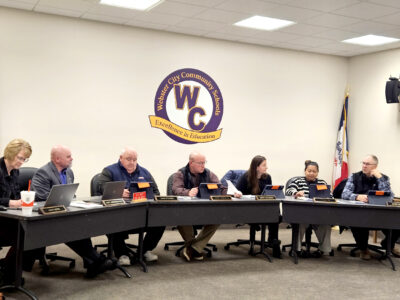50 years of gratitude
In 1975, a Vietnamese family was resettled in Webster City. Fifty years later they returned to say thank you.

At Webster City's Gridiron Grill & Sports Bar, two families were reunited 50 years after meeting during the last terrible months of the Vietnam War. Left to right: members of the Nyguen family — Hwy, Rose, Emma, Nancy and Hien — surround John and Ramona Zahn. At far rear is Rose's husband, Daniel.
The call was unexpected.
One recent day in mid-May, Ramona and John Zahn of Webster City answered their phone, little suspecting it would be one of the most unusual calls of their lives. On the other end of the line was Hien Nguyen, from Fresno, California, and she had a simple message: Thank you.
Nguyen had dreamed of the day she’d come to Webster City to say that in person. You see, she’d been here before, and the generosity of the Zahns and a small band of others in Webster City, changed her life forever.
The news of April 30, 1975, had been expected. That day, Saigon, capital of South Vietnam, fell to communist North Vietnam, and a war that raged for 20 years and took the lives of 3 million Vietnamese and 58,000 U.S. military personnel finally ended.
TV newsreels of desperate people scrambling to board the last helicopter out of the U.S. Embassy are as strongly etched in memories.
In February 1975, Hien Nguyen and eight members of her family boarded a U.S. military plane in Saigon and flew to the United States.
The Zahns aren’t sure of their exact point of entry, but research suggests it was either Fort Chafee, Arkansas, or Elgin Air Force Base, Florida.
The Nguyens belong to the Tai Dam Vietnamese community, an ethnic minority of the greater Tai peoples, and are culturally similar to natives of Thailand and Laos. For centuries, their ancestors lived in Thailand, Laos, Burma, Southern China, and Vietnam.
After France colonized Vietnam in the early 20th century, many Tai Dam learned French, adopted a western lifestyle, and enlisted in the French army to fight the communists. Others worked in government or for French companies. In 1954, when the French gave up their claims to Vietnam, many Tai Dam migrated to South Vietnam, France or the U.S.
Those left behind were at the mercy of the communists of North Vietnam. Unable to accept the communist ideology, many of the freedom-loving Tai Dam were sent to “re-education camps” where they faced cultural brain-washing, physical abuse, and often relocation that split up their families.
The arrival in the United States of the Nguyens and their Tai Dam brethren was not an accident. It was carefully planned.
The effort began with a U.S. government employee in Laos, Arthur Crisfield, who heard of the plight of the Tai Dam and their need to leave Vietnam immediately or face genocide.
Crisfield wrote letters to 30 U.S. governors asking them to accept resettlement of Tai Dam in their states.
Only one replied: Gov. Robert Ray of Iowa.
Ray knew Iowa had been losing population, especially in small towns and farms, since the 1940s. He also knew of the Tai Dam’s reputation as first-class farmers and hard workers. He believed that, with acculturation, they’d one day make exemplary Americans.
Ray also knew hostility toward southeast Asians was running high in Iowa. He could be hurt politically by sponsoring Vietnamese immigration after the stinging defeat of U.S. military forces in Vietnam.
Yet he persisted, stressing humanitarian values over politics.
Ray quickly set up a task force to tackle details of immigration, signing an agreement with the U.S. State Department to accept 1,200 Vietnamese refugees over two years. The task force’s main responsibility was to find jobs for newly-arrived families. Realizing the Vietnamese would face many small problems adapting to life in America, Ray required each refugee to have an Iowa host family to smooth the transition.
To the newly-formed Social Concerns Committee of Webster City’s St. Thomas Aquinas Catholic Church, sponsoring a Vietnamese family was a tall order, but one they took it on with determination. It was a way to put faith into action.
The committee was made up of Gwen McCormick, Fred and Kathy Hahne, Dave Malo and the Zahns.
John Zahn singled out the work of Malo as “an interpreter who did a great job. He communicated by writing notes in English.”
The volunteers gathered dishes, kitchen utensils, bedding, clothes and shoes. Gwen and Max McCormick loaned their farmhouse, west of Webster City, as the family’s home. There was no car, so volunteers drove the family to work, shopping, church and medical appointments.
Gov. Ray prioritized family immigration and, in this, the Nguyens were typical. Their nine family members included grandparents, parents and children. The youngest, Rose, was just three days old when she arrived in Webster City.
In one of his first conversations with the family, John Zahn remembers asking why they left Vietnam. He never forgot Hien’s poignant, one-word answer: “Freedom.”
During that May phone call, a date was set for lunch. The Hien Nguyen family flew from Fresno, where they live today, to Des Moines, rented a car, and bought lunch for Ramona and John Zahn at Grid Iron in Webster City.
In the 50 years since 1975, the Nguyens have become — proudly — American. Following the well-trodden trail of immigrants everywhere, the first generation worked long hours at menial jobs to make a better life for the children. Their children, now adults, have bettered themselves through education and more hard work.
Ramona Zahn remembers that lunch simply as “hugs, tears and a thank you card.”
But just beneath the surface, everyone at that lunch knew there was so much more: two families, thrown together by war and fate. Two families coming to grips with the truly important things of this life.
It reads so much like a movie script it might not be real.
But it is real.
Two families, one seeking freedom, were united forever.
That’s 50 years of gratitude.
And counting.

Hien Nyugen’s card, which she carried nearly 1,800 miles from Fresno to Webster City to give Ramona and John Zahn in person, is a dramatic, and heartfelt thank you for a new life in a new country for her family that began in Webster City 50 years ago.


